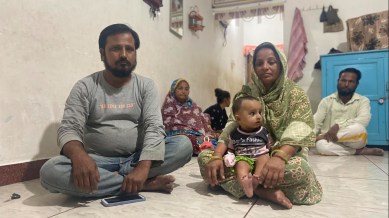Stay updated with the latest - Click here to follow us on Instagram
Year after Morbi bridge collapse, couples turn to IVF, give adopted babies names of children they lost
The compensation given to families from the Gujarat government and the Centre combined amounted to Rs 10 lakh for every family member who died in the incident.

Kantaben Muchhadiya cannot stop weeping at the memory of her three sons, Chirag, 20, Dharmik, 18, and Chetan, 16, who were among the 135 people killed when the suspension bridge on the Machchhu River in Gujarat’s Morbi town collapsed on October 30 last year.
At 40 years of age, she and husband Rameshbhai, 42, have become parents again to two-month-old Chirag, born after an IVF cycle and named in memory of his dead brother. The couple used part of the compensation they received after the tragedy to undergo IVF and conceive their fourth child.
The compensation given to families from the Gujarat government and the Centre combined amounted to Rs 10 lakh for every family member who died in the incident.
Kantaben and Rameshbhai find it difficult to talk about their loss. Chirag, the oldest, worked at a ceramic unit and was the breadwinner of the family. Kantaben wept uncontrollably as she remembered her sons. On Chetan, her youngest son to have died in the bridge collapse, Kantaben said: “He had just passed his 10th boards exam. He usually never left home, but that day, he went and never came back.”
On October 30, 2022, a Sunday outing for many turned fatal after the overcrowded bridge, which was well over a century old, collapsed. As many as 55 of the 135 dead were children.
The scale of the tragedy left a town in grief, even as some tried to move on by remarrying or becoming parents again.
The Miras lost their 20-year-old daughter, Nafisa, that day. They have since adopted a baby and, like the Muchhadiyas, named her after their dead child.
On the day of the tragedy, ice cream parlour owner Mehboob Mira, 47, had taken his wife, Rashida, 40, and his parents out to buy silver for their would-be son-in-law. Nafisa was to be engaged 20 days later. However, minutes after they came back home from their shopping trip, the Miras got to know about the bridge collapse. In the early hours of the next day, they identified six members of their family, including Nafisa, among the bodies of those killed in the collapse.
On May 14 this year, Mehboob’s youngest brother had a daughter, and within six days, Mehboob adopted her.
“My Nafisa was born on May 21, and this Nafisa (his adopted daughter) was born the same month. They look exactly the same. This cannot be a coincidence,” said Mehboob.
The family, however, is still grieving. “The grief never leaves us, but with the new baby, there are a few moments of respite amid the tears,” he said.
Recalling the day of the tragedy, he said: “We had guests over on October 30, because a relative of ours was getting engaged that day. After the function was over at 3 pm, 35 people from our family, all women and children, went to the bridge.”
“Now every time we see the bridge debris, our memories of that day are refreshed. Not a single day goes by when I don’t think about my sisters and my daughter. Roshanben was the youngest and was pampered by all,” Mehboob said, referring to his two sisters – Ruksanaben Chauhan, 40, and Roshanben Pathan, 28 – who also died that day.
Among those who lost their whole family that day were brothers Pradyumansinh Jadeja, 35, and Pratapsinh Jadeja, 33 – both farmers from Wankaner.
Pradyumansinh’s eyes welled up at the mention of his two children, 11-year-old Divyarajsinh and 10-year-old Dharmaraj, who died in the bridge collapse. Pratapsinh’s daughters Devyanshi, 10, and Devikaba, 8, also died that day. The brothers also lost their wives and their mother to the tragedy. Since then, they have spent most of their nights at a roadside dhaba.
“We were living in Morbi earlier, but after their deaths, the house was so empty. What do we do with it when we have lost all our family?…No amount of money can compensate for the loss of our entire family. We can only consider it to be some justice if the accused are punished so that at least there will not be an incident like this again,” the brothers said.
Now, they have both remarried, but are reluctant to talk about it.
The Jhulto Pul, the bridge that collapsed, was one of the main attractions in Morbi, and was located at the heart of the town. A year on from the incident, the suspension cables of the collapsed bridge remain hanging at the site. Some cables and planks lie dumped on the banks. Rusted locks forbid access to what used to be the entrance to the bridge. A shiny sign saying “Jhulto Pul, operated and maintained by Oreva” remains intact.
In-charge chief officer of the Morbi municipality and resident additional collector N K Muchhar said they have no plan to remove the debris until the trial of the case is concluded. “The matter is sub-judice and we are treating the debris as muddamal (material evidence). So, in case there is any requirement of evidence, it can be provided,” he said. There is also no plan in place to erect another bridge across the Machchhu River, he said.
Jaysukh Patel, the managing director of the Oreva Group, has been named the prime accused in the case and is among the 10 persons arrested for culpable homicide, of which five are in jail. A special investigation team recently also found administrative lapses on the part of the municipality.